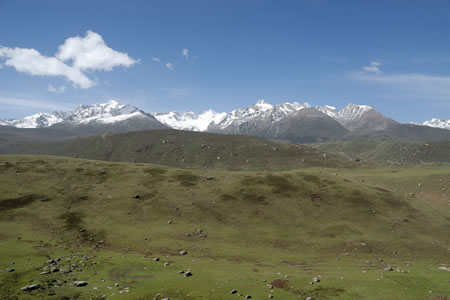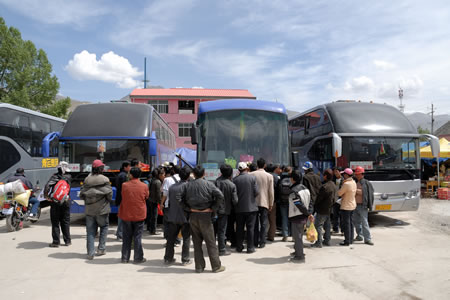English | Dutch |
|
| An exciting day | |
Xīníng (China), May 29th 2010 |
|
It is half past four in the morning when we reach the outskirts of Xīníng. The fifteen hours bus journey brought us all the way from the town of Yùshù to Xīníng, a ride of more than 800 kilometres. The man next to us in the bus coughs for the last time without his hand before his mouth, just to be sure that his bacilli are torpedoed through most of the bus. Fortunately, we got our hepatitis vaccinations, so there isn’t a real reason for us to be worried. An exciting day is almost coming to an end. The day starts early in the small town of Sêrxu, in the far north-western part of the province Sichuan. It is half past six when we leave the hotel, because the owner of the hotel told us that the bus to our destination of today, Yùshù, will leave at seven. We don’t really mind leaving this hotel. The room was ok, but the toilet had the cleanliness of an average Chinese public toilet. And that isn’t a compliment. Besides that, she assured us at check-in, that she had the only guesthouse in town with running water. We read in our travel book that running water is indeed rare in Sêrxu, so we decided to take the room after we checked the water pressure in the bath room and even after we noticed that the guesthouse had no shower. But what she didn’t tell us is, that the running water disappeared soon after we paid her the inflated price of 100 Yuan (€ 10.00) for the room. At a quarter to seven we stroll through the main street of Sêrxu in search of transport to Yùshù. But we are way too early. We share the streets with tens of street dogs that rule the streets at night, but that’s all the life on the streets at this time of the day. We wait for a while and around a quarter past seven the first minibuses appear on the streets. We speak to the drivers to ask for their destination and after some asking around, we find a minibus for Yùshù. However, we are the first passengers, so we spend more than thirty minutes riding around town to pick up more passengers. At eight o’clock the bus is full and we set course for Yùshù. |
|
 |
|
Landscape on the road from Sêrxu to Yùshù |
|
Sêrxu is located at an elevation of 4100 metres on the Tibetan Plateau. Yesterday, we saw already on our way to Sêrxu, that the landscape is fantastically beautiful. The landscape during the ride to Yùshù isn’t different. We drive through a waving mountainous area that is the domain of nomads and their yaks. The tents of the nomads are put down on the valley floor while the yaks are searching the area in search for the finest grass. The valleys are surrounded by snow-capped peaks and there are no trees whatsoever. We are above the tree line and the only noticeable vegetation is small scrub and grass. The road winds its way up and after a ride of approximately an hour, we cross a pass of around 4700 metres, which is covered in colourful prayer flags. The monk in our minibus says his prayer, while the minibus driver hits the claxon while crossing the pass. From here, the roads winds steadily down till we eventually reach the vicinity of Yùshù. When we reach the outskirts of Yùshù, we realise that the rumours that we heard the previous days are true. Some Chinese and Tibetan people tried to tell us something about an earthquake in Yùshù. But because we didn’t speak people who even had a little bit knowledge of the English language last weeks, we couldn’t find out what the exact situation is. What we did know however, is that nobody prevented us from boarding a bus in the direction of the hit area. So we thought that the situation wasn’t probably that bad. And besides that, backtracking all the way the Chengdu wasn’t really an option for us. But as soon as we reach the outskirts of Yùshù, we see that something bad happened here. We see many blue emergency tents along the road that leads into town. The houses in where the people used to live don’t look really damaged, but people are probably too afraid to live in them. But as soon as we reach the centre of the city, we notice what the earthquake really did to this town. Many of the buildings are destroyed and are changed in piles of concrete and twisted steel. Other buildings are still upright, but it seems that the government prohibits the use of any standing building with more than one floor. They just don’t want to take the risk that the building is too damaged and unsafe for the residents. The quake of 7.1 on the scale of Richter which shook this city on April 14th this year had a destructive result. The city is completely in ruins and more than 2200 people lost their lives. | |
 |
|
Waiting to board the bus from Yùshù to Xīníng |
|
| But is seems that people proceeded with their lives again. They have no choice and have to move on. The centre of the city is covered with blue emergency tents in where people live, run a restaurant or operate a shop. Military people regulate the traffic in town and on a dusty square in the centre of the city, social workers are distributing emergency goods. Big machines are tearing down the still standing buildings, while trucks carry away the remains of these buildings. We also see some old ladies with plastic bags on their back in where they carry steel items that they found in the mess. Life goes on, also for them, and everybody is trying to find a way to earn a small income in these difficult times. A young lady calls to us ‘welcome in Yùshù’ but we are not feeling comfortable in this situation. We are no disaster tourists and there is nothing to find here for us. The decision to leave the city is soon made for us. The hotel that we had in mind is destroyed, and when we walk around to find another hotel, none of them seems to be operational anymore. We decide to leave the city and walk back to the bus station to buy a ticket for the first bus to Xining. We only have to wait for half an hour before the bus leaves the bus station and finds its way slowly through the city on the way to the exit road to Xining. Once again we see the disastrous result of the quake. We also see some people smiling again. People take life as it comes and are very resilient. And that is admirable. They already live a tough life in this very remote and harsh part of China, and than they also get to digest this. We feel very sorry for them and the only thing we can do is to hope that they will recover as soon as possible.
N.B. | |